使役动词
英语 使役动词用法总结

英语使役动词用法总结英语中的使役动词(Causative Verbs)是用来表示某个人或事物被其他人或事物所控制或支配的动词,通常用于表达某件事情被他人或外界因素所促成或导致。
以下是英语中常见的使役动词及其用法:1. Have:表示某人被他人所控制或支配,例如:I had my car repaired yesterday.(昨天我让人修理了我的车。
)2. Get:表示某人被他人所促成或导致,例如:She got her hair cut at the salon.(她在发廊剪了头发。
)3. Make:表示某人被迫或被控制去做某事,例如:He made me finish my homework before dinner.(他让我在晚餐前完成作业。
)4. Let:表示某人被允许或被授权去做某事,例如:They let me use their computer.(他们允许我使用他们的电脑。
)5. Help:表示某人受到他人的帮助或协助,例如:She helped me with my luggage.(她帮我拿行李。
)6. Have someone do something:表示某人被他人所控制或支配去做某事,例如:I had my assistant finish the report.(我让我的助手完成了报告。
)7. Get someone to do something:表示某人被他人所促成或导致去做某事,例如:I got my friend to help me move.(我让我的朋友帮我搬家。
)8. Make someone do something:表示某人被迫或被控制去做某事,例如:My boss made me work overtime.(我老板让我加班。
)9. Let someone do something:表示某人被允许或被授权去做某事,例如:My parents let me stay out late.(我父母让我晚上出去晚些回家。
使役动词
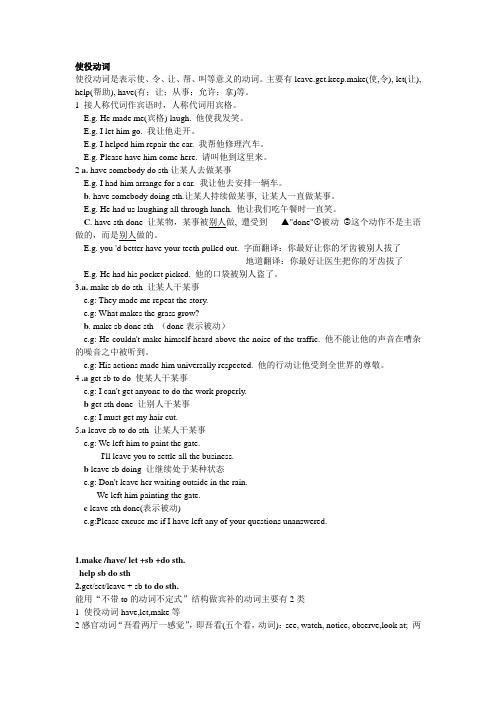
使役动词使役动词是表示使、令、让、帮、叫等意义的动词。
主要有leave.get.keep.make(使,令), let(让), help(帮助), have(有;让;从事;允许;拿)等。
1 接人称代词作宾语时,人称代词用宾格。
E.g. He made me(宾格) laugh. 他使我发笑。
E.g. I let him go. 我让他走开。
E.g. I helped him repair the car. 我帮他修理汽车。
E.g. Please have him come here. 请叫他到这里来。
2 a. have somebody do sth让某人去做某事E.g. I had him arrange for a car. 我让他去安排一辆车。
b. have somebody doing sth.让某人持续做某事, 让某人一直做某事。
E.g. He had us laughing all through lunch. 他让我们吃午餐时一直笑。
C. have sth done 让某物,某事被别人做, 遭受到▲"done"①被动②这个动作不是主语做的,而是别人做的。
E.g. you 'd better have your teeth pulled out. 字面翻译:你最好让你的牙齿被别人拔了地道翻译:你最好让医生把你的牙齿拔了E.g. He had his pocket picked. 他的口袋被别人盗了。
3.a. make sb do sth 让某人干某事e.g: They made me repeat the story.e.g: What makes the grass grow?b. make sb done sth (done表示被动)e.g: He couldn't make himself heard above the noise of the traffic. 他不能让他的声音在嘈杂的噪音之中被听到。
使役动词的用法及口诀

使役动词的用法及口诀一、使役动词的定义和分类使役动词是表示命令、请求、允许、禁止等含义的动词,通常分为以下三类:1.完全使役动词:指动词所表示的动作完全由宾语完成,例如“make、have、let、cause”等。
2.不完全使役动词:指动词所表示的动作部分由宾语完成,例如“get、put、keep、send”等。
3.感觉使役动词:指动词所表示的是主语对宾语的感觉,例如“see、hear、watch、observe”等。
二、使役动词的用法和搭配使役动词的用法和搭配多种多样,下面列举一些常见的用法和搭配:1.动词+宾语:使役动词后面接宾语,表示动作的对象。
例如:“make thephone ring”、“have the machine run”。
2.动词+宾语+宾补:使役动词后面接宾语和宾补,表示动作的结果或方式。
例如:“let the cat in”、“get the car fixed”。
3.动词+间接宾语+直接宾语:使役动词后面接间接宾语和直接宾语,表示动作的受益者和接受者。
例如:“send a letter to him”、“buy a book for her”。
4.情态动词+使役动词:情态动词后面接使役动词,表示情态的命令、请求、允许等含义。
例如:“should have the courage to do it”、“may let you go”。
三、使役动词的口诀和记忆技巧使役动词的记忆口诀如下:make有make do感觉生动抽象, 其它是可看见.get有get do感觉时态较特殊, 其它是可看见.let有let do感观抽象不难记, 其它是可看见.have有have do感观抽象不难记, 其它是可看见.四、使役动词的句型和语法规则使役动词在句型和语法规则上有一些特殊之处,下面列举一些常见的用法:1.使役动词的否定式和疑问式一般要借助助动词do或does。
例如:“Don’t make him cry”、“Did you let him go”。
使役动词实意动词助动词

使役动词是表示使、令、让、帮、叫等意义的不完全及物动词,主要有make (使,令),let (让),help (帮助),have (叫) ........ ,order 所谓使役,就是使什么怎么做。
比如:I make the boy cry.我让那个男孩哭了.1have the girl wait for me.我让那个女孩等我.总之,使役就是让什么怎么样,或怎么做.使役动词有以下用法:a.have somebody do sth让某人去做某事例:i had him arrange for a car.b.have somebody doing sth.让某人持续做某事。
例:he had us laughing all through lunch.c.注意:用于否定句时,表示“允许”i won't have you running around in the house.例:我不允许你在家里到处乱跑。
d.have sth done 让别人干某事,遭受到例:you 'd better have your teeth pulled out.He had his pocket picked.notes: "done"这个动作不是主语发出来的。
e.用于被动句时,不定式要加TO例:1 was made to repeat the story.实意动词即行为动词,表示动作的动词。
它分为及物动词和不及物动词两种及物动词后面必须跟宾语意义才完整的实义动词,叫做及物动词(transitive verb)。
如:I believe that the committee will consider our suggestion.我相信委员会将会考虑我们的建议。
“How long can I keep the book ?”Harry asked.哈里问:“这本书我可以借多久?”Dr. Bethune set us a good example. 白求恩大夫给我们树立了好榜样。
使役动词
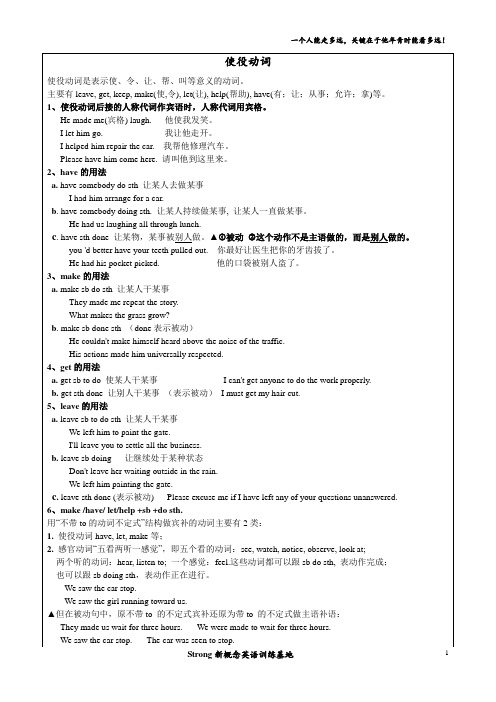
使役动词使役动词是表示使、令、让、帮、叫等意义的动词。
主要有leave, get, keep, make(使,令), let(让), help(帮助), have(有;让;从事;允许;拿)等。
1、使役动词后接的人称代词作宾语时,人称代词用宾格。
He made me(宾格) laugh. 他使我发笑。
I let him go. 我让他走开。
I helped him repair the car. 我帮他修理汽车。
Please have him come here. 请叫他到这里来。
2、have的用法a. have somebody do sth 让某人去做某事I had him arrange for a car.b. have somebody doing sth. 让某人持续做某事, 让某人一直做某事。
He had us laughing all through lunch.c. have sth done 让某物,某事被别人做。
▲①被动②这个动作不是主语做的,而是别人做的。
you 'd better have your teeth pulled out. 你最好让医生把你的牙齿拔了。
He had his pocket picked. 他的口袋被别人盗了。
3、make的用法a. make sb do sth 让某人干某事They made me repeat the story.What makes the grass grow?b. make sb done sth (done表示被动)He couldn't make himself heard above the noise of the traffic.His actions made him universally respected.4、get的用法a. get sb to do 使某人干某事I can't get anyone to do the work properly.b. get sth done 让别人干某事(表示被动)I must get my hair cut.5、leave的用法a. leave sb to do sth 让某人干某事We left him to paint the gate.I'll leave you to settle all the business.b. leave sb doing 让继续处于某种状态Don't leave her waiting outside in the rain.We left him painting the gate.c. leave sth done (表示被动) Please excuse me if I have left any of your questions unanswered.6、make /have/ let/help +sb +do sth.用“不带to的动词不定式”结构做宾补的动词主要有2类:1.使役动词have, let, make等;2.感官动词“五看两听一感觉”,即五个看的动词:see, watch, notice, observe, look at;两个听的动词:hear, listen to; 一个感觉:feel.这些动词都可以跟sb do sth, 表动作完成;也可以跟sb doing sth,表动作正在进行。
使役动词知识点总结

使役动词知识点总结一、使役动词的基本用法1.1 使役动词的基本功能是通过对宾语的动作实施控制,使其发生某种动作或者状态。
比如:- She made him clean the room.(她让他打扫房间)- He had her sing a song.(他让她唱首歌)- They got him to confess.(他们促使他招供)1.2 有时候,使役动词的宾语可以是动词不定式,表示被控制的动作或者状态。
比如:- She made him study hard.(她让他用功学习)- They had her do the dishes.(他们让她洗碗)- The teacher got the students to listen to his lecture.(老师让学生们听他的讲座)1.3 使役动词也可以接双宾语,表示被控制的人和动作的对象。
比如:- She made him a cake.(她给他做了一个蛋糕)- They had their car repaired.(他们让修了他们的汽车)- The boss got his employees new uniforms.(老板让员工们换了新的制服)二、常见的使役动词和它们的语法结构2.1 make“make”是最常见的使役动词之一,其语法结构比较简单,后面可以接宾语和动词原形或者动词不定式。
比如:- make + 宾语 + 动词原形She made him clean the room.(她让他打扫房间)- make + 宾语 + 动词不定式She made him study hard.(她让他用功学习)2.2 have“have”也是常见的使役动词,其语法结构与“make”类似,后面同样可以接宾语和动词原形或者动词不定式。
比如:- have + 宾语 + 动词原形He had her sing a song.(他让她唱首歌)- have + 宾语 + 动词不定式They had her do the dishes.(他们让她洗碗)2.3 get“get”同样可以表示使役的意思,其语法结构也和“make”、“have”类似。
6大使役动词的用法

6大使役动词的用法在英语学习中,使役动词是一类非常重要且常用的动词。
它们具有独特的用法和含义,能够生动地表达让某人做某事或者使某物处于某种状态。
今天,咱们就来详细聊聊 6 个常见的使役动词:make、let、have、get、help 和 cause 的用法。
先来说说“make”。
“make”这个词啊,是我们最常见的使役动词之一。
它的常见用法是“make +宾语+动词原形”,意思是“使某人做某事”。
比如说,“The boss made the workers work overtime”(老板让工人们加班。
)在这个句子里,“workers”是宾语,“work”是动词原形,“make”就起到了让“workers”去“work”的作用。
但要注意哦,如果在被动语态中,就得变成“be made to do”的形式,像“The workers were made towork overtime by the boss”接下来是“let”。
“let”的用法相对简单些,通常是“let +宾语+动词原形”,表示“允许某人做某事”。
比如,“Let me go”(让我走。
)“let”这个词,语气比较温和,没有“make”那么强硬。
再看看“have”。
“have”作为使役动词时,常见的结构有“have +宾语+动词原形”和“have +宾语+过去分词”。
“have +宾语+动词原形”表示“让某人做某事”,例如,“I'll have him come here”(我会让他来这儿。
)而“have +宾语+过去分词”则表示“使某事被做”,像“He had his hair cut”(他理发了。
)这里的“hair”和“cut”之间是被动关系。
“get”也是个常用的使役动词。
“get +宾语+动词不定式”,意思是“使某人做某事”,例如,“I got him to help me”(我让他帮助我。
)它还有“get +宾语+现在分词”的用法,表示“使某人或某物处于某种状态”,比如,“The joke got us laughing”(这个笑话让我们大笑起来。
中考英语使役动词及其用法全汇总
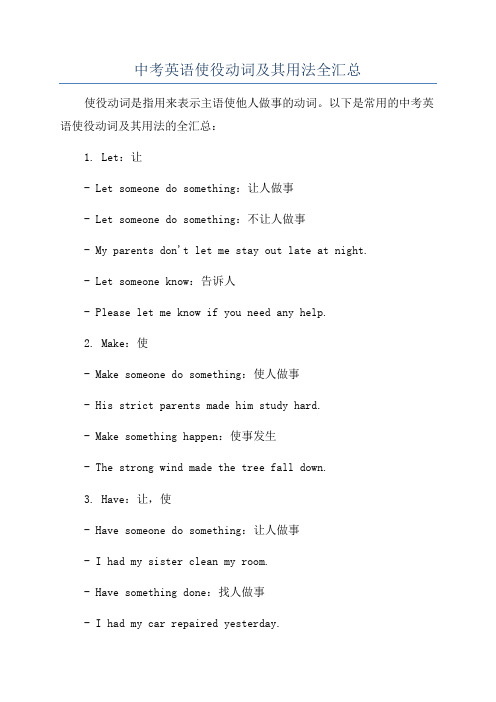
中考英语使役动词及其用法全汇总使役动词是指用来表示主语使他人做事的动词。
以下是常用的中考英语使役动词及其用法的全汇总:1. Let:让- Let someone do something:让人做事- Let someone do something:不让人做事- My parents don't let me stay out late at night.- Let someone know:告诉人- Please let me know if you need any help.2. Make:使- Make someone do something:使人做事- His strict parents made him study hard.- Make something happen:使事发生- The strong wind made the tree fall down.3. Have:让,使- Have someone do something:让人做事- I had my sister clean my room.- Have something done:找人做事- I had my car repaired yesterday.4. Get:让,使- Get someone to do something:让人做事- Get something done:找人做事- I need to get my hair cut.5. Help:帮助- Help someone do something:帮助人做事- Can you help me open the door?- Help someone with something:帮助人做事- I need help with my homework.6. Ask:请求,要求- Ask someone to do something:请求人做事- I asked my teacher to explain the problem to me.。
使役动词的用法 新东方
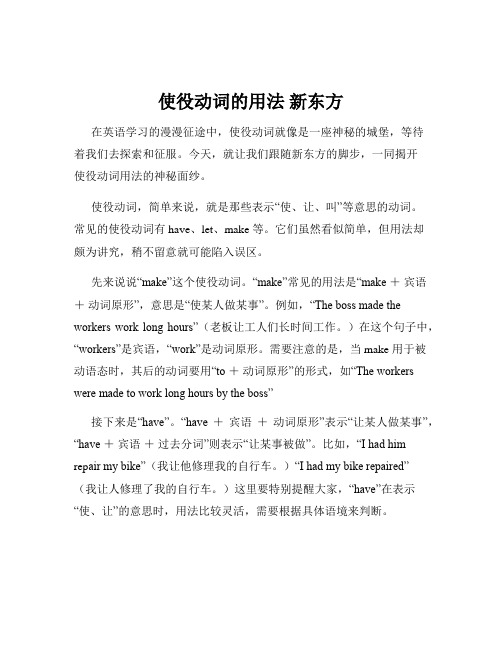
使役动词的用法新东方在英语学习的漫漫征途中,使役动词就像是一座神秘的城堡,等待着我们去探索和征服。
今天,就让我们跟随新东方的脚步,一同揭开使役动词用法的神秘面纱。
使役动词,简单来说,就是那些表示“使、让、叫”等意思的动词。
常见的使役动词有 have、let、make 等。
它们虽然看似简单,但用法却颇为讲究,稍不留意就可能陷入误区。
先来说说“make”这个使役动词。
“make”常见的用法是“make +宾语+动词原形”,意思是“使某人做某事”。
例如,“The boss made the workers work long hours”(老板让工人们长时间工作。
)在这个句子中,“workers”是宾语,“work”是动词原形。
需要注意的是,当 make 用于被动语态时,其后的动词要用“to +动词原形”的形式,如“The workers were made to work long hours by the boss”接下来是“have”。
“have +宾语+动词原形”表示“让某人做某事”,“have +宾语+过去分词”则表示“让某事被做”。
比如,“I had himrep air my bike”(我让他修理我的自行车。
)“I had my bike repaired”(我让人修理了我的自行车。
)这里要特别提醒大家,“have”在表示“使、让”的意思时,用法比较灵活,需要根据具体语境来判断。
然后是“let”。
“let +宾语+动词原形”,意思是“允许某人做某事”。
例如,“Let him go”(让他走。
)需要注意的是,“let”一般用于主动语态,如果要用于被动语态,通常用“be allowed to”来表达。
在使用使役动词时,还有一些容易被忽略的细节。
比如,它们后面接的宾语补足语的形式要根据具体情况来选择,是用动词原形、过去分词还是现在分词,都有一定的规则。
再比如,使役动词与其他类似意思的动词在用法上也存在差异,需要我们仔细辨别。
使役动词

使役动词英语中使役动词是表示使、令、让、帮、叫等意义的不完全及物动词,主要有leave(离开).get(得到).keep(保持).make(使,令),let(让),help(帮助),have (有;让;从事;允许;拿)等。
(一)have“使,让”不用于被动语态“,1.have +宾语+done(1)叫、让、请别人做某事,表动作的执行者不是主语也不是宾语,而是别人。
例 I’ll have my bike repaired this afternoon. 今天下午我要请人修自行车。
(2)遭遇不幸事件例 He had his wallet stolen at the station. 他的钱包在火车站不幸遭窃。
2.have +宾语+do“让……做某事”,动作执行者为宾语。
例 He had her go to school. 他让她去学校。
3.have +宾语+doing 让……做某事”动作执行者为句子宾语,但动词必须为持续性动词,后面常接时间段。
例 He had her standing in the rain for two hours. 他让她在雨中站了两个小时。
4.have +宾语+adj./adv./prep. 促使某一动作发生例 Please have your money ready. 请准备好钱。
(二)make “使……”有轻微强迫之意1.make +宾语+do“迫使某人做某事”,被动语态为 be made to do.例 The boy made the girl cry. 男孩把女孩惹哭了。
2.make+宾语+adj./adv./prep./n.“使……处于某种状态”例 His illness made him very weak. 他的病使他很虚弱。
3.make +宾语+doing “使……处于某种状态”,并强调动作的主动性例 The story made him feeling sad.这个故事使他很难受。
三个使役动词及其用法

三个使役动词及其用法在英语学习中,使役动词是一类比较特殊且重要的动词,它们能够表达“使……”“让……”的意思,对我们准确地表达思想和描述动作有着重要的作用。
今天,咱们就来好好聊聊三个常见的使役动词:make、let 和 have,以及它们的用法。
先来说说 make 这个使役动词。
make 的常见用法有很多。
它后面可以接宾语和不带 to 的动词不定式,也就是“make +宾语+动词原形”,比如:The boss made the workers work long hours(老板让工人们长时间工作。
)这里,“make the workers work”就体现了“使工人工作”的意思。
另外,make 还可以接宾语和形容词,也就是“make +宾语+形容词”,例如:The news made him sad(这个消息让他难过。
)“sad”这个形容词描述了“him”的状态,是因为“the news”导致的。
make 还有“make +宾语+名词”的用法,像:We made him monitor(我们让他当班长。
)接下来看看 let 。
let 的用法相对简单一些,它后面通常接宾语和不带 to 的动词不定式,即“let +宾语+动词原形”,比如:Let me go(让我走。
)和 make 不同的是,let 更侧重于“允许”的意思,语气相对比较委婉。
再讲讲 have 。
have 作为使役动词时,常见的用法有“have +宾语+动词原形”,表示“让……做某事”,例如:I had him repair my bike (我让他修理我的自行车。
)“have +宾语+过去分词”这个结构也很常见,意思是“使……被……”,比如:I had my hair cut(我剪了头发。
)这里“my hair”是被剪的,用“cut”的过去分词形式。
在使用这三个使役动词的时候,有一些需要注意的地方。
首先,它们在主动语态中,后面接的动词形式有所不同,make 和 have 接动词原形或过去分词,let 只接动词原形。
10个常见的使役动词的用法
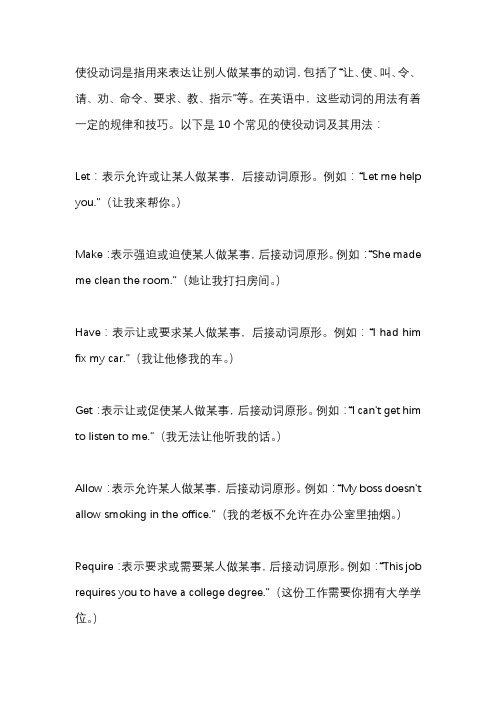
使役动词是指用来表达让别人做某事的动词,包括了“让、使、叫、令、请、劝、命令、要求、教、指示”等。
在英语中,这些动词的用法有着一定的规律和技巧。
以下是10个常见的使役动词及其用法:Let:表示允许或让某人做某事,后接动词原形。
例如:“Let me help you.”(让我来帮你。
)Make:表示强迫或迫使某人做某事,后接动词原形。
例如:“She made me clean the room.”(她让我打扫房间。
)Have:表示让或要求某人做某事,后接动词原形。
例如:“I had him fix my car.”(我让他修我的车。
)Get:表示让或促使某人做某事,后接动词原形。
例如:“I can't get him to listen to me.”(我无法让他听我的话。
)Allow:表示允许某人做某事,后接动词原形。
例如:“My boss doesn't allow smoking in the office.”(我的老板不允许在办公室里抽烟。
)Require:表示要求或需要某人做某事,后接动词原形。
例如:“This job requires you to have a col lege degree.”(这份工作需要你拥有大学学位。
)Ask:表示请求或邀请某人做某事,后接动词原形。
例如:“I asked him to come to the party with me.”(我邀请他和我一起去参加派对。
)Tell:表示命令或告诉某人做某事,后接动词原形。
例如:“My boss told me to finish the report by Friday.”(我的老板命令我在周五之前完成报告。
)Advise:表示建议或劝告某人做某事,后接动词原形。
例如:“My docto r advised me to quit smoking.”(我的医生建议我戒烟。
)Teach:表示教导或训练某人做某事,后接动词原形。
使役动词知识点总结

使役动词知识点总结使役动词是用来表示"使人做事"的动词。
在汉语中,使役动词通常是通过在动词前面加上使、让、叫等词语来实现的。
1.使役动词的基本结构:[使役动词]+[宾语]+[动词]+[宾语补足语]。
例如:我让他吃饭。
(I let him eat.)2.使役动词的宾语可以是人或物,宾语补足语可以是动词、形容词或名词。
例如:我让他学习。
(I let him study.)她使我生气了。
(She made me angry.)他叫我去超市买东西。
(He told me to go to the supermarket to buy things.)3.使役动词的否定形式是在使役动词前面加上不。
例如:我不让他吃饭。
(I don't let him eat.)4.使役动词有时会与被动语态结合,表示"被迫做事"。
例如:我被他逼着写作业。
(I am forced by him to do homework.)5.使役动词还可以用来表示请求、命令、建议等语气。
例如:请你帮我买个苹果。
(Please help me buy an apple.)不要在教室里吵闹。
(Don't make noise in the classroom.)总之,使役动词是用来表示"使人做事"的动词,通过在动词前加上使、让、叫等词语来实现。
使役动词的结构可以是[使役动词]+[宾语]+[动词]+[宾语补足语],宾语可以是人或物,宾语补足语可以是动词、形容词或名词。
使役动词
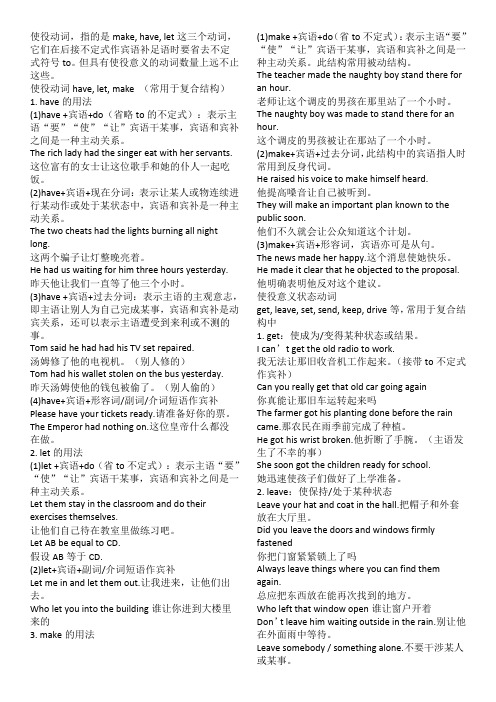
使役动词,指的是make, have, let这三个动词,它们在后接不定式作宾语补足语时要省去不定式符号to。
但具有使役意义的动词数量上远不止这些。
使役动词have, let, make (常用于复合结构)1. have的用法(1)have +宾语+do(省略to的不定式):表示主语“要”“使”“让”宾语干某事,宾语和宾补之间是一种主动关系。
The rich lady had the singer eat with her servants. 这位富有的女士让这位歌手和她的仆人一起吃饭。
(2)have+宾语+现在分词:表示让某人或物连续进行某动作或处于某状态中,宾语和宾补是一种主动关系。
The two cheats had the lights burning all night long.这两个骗子让灯整晚亮着。
He had us waiting for him three hours yesterday.昨天他让我们一直等了他三个小时。
(3)have +宾语+过去分词:表示主语的主观意志,即主语让别人为自己完成某事,宾语和宾补是动宾关系,还可以表示主语遭受到来利或不测的事。
Tom said he had had his TV set repaired.汤姆修了他的电视机。
(别人修的)Tom had his wallet stolen on the bus yesterday.昨天汤姆使他的钱包被偷了。
(别人偷的)(4)have+宾语+形容词/副词/介词短语作宾补Please have your tickets ready.请准备好你的票。
The Emperor had nothing on.这位皇帝什么都没在做。
2. let的用法(1)let +宾语+do(省to不定式):表示主语“要”“使”“让”宾语干某事,宾语和宾补之间是一种主动关系。
Let them stay in the classroom and do their exercises themselves.让他们自己待在教室里做练习吧。
使役动词
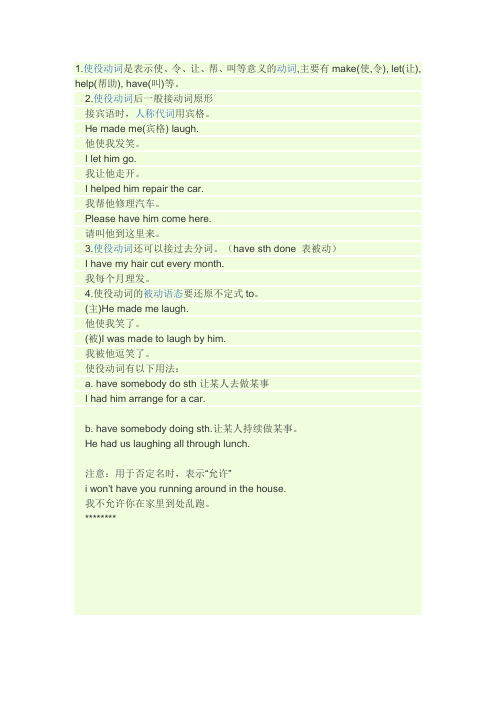
1.使役动词是表示使、令、让、帮、叫等意义的动词,主要有make(使,令), let(让), help(帮助), have(叫)等。
2.使役动词后一般接动词原形接宾语时,人称代词用宾格。
He made me(宾格) laugh.他使我发笑。
I let him go.我让他走开。
I helped him repair the car.我帮他修理汽车。
Please have him come here.请叫他到这里来。
3.使役动词还可以接过去分词。
(have sth done 表被动)I have my hair cut every month.我每个月理发。
4.使役动词的被动语态要还原不定式to。
(主)He made me laugh.他使我笑了。
(被)I was made to laugh by him.我被他逗笑了。
使役动词有以下用法:a. have somebody do sth让某人去做某事I had him arrange for a car.b. have somebody doing sth.让某人持续做某事。
He had us laughing all through lunch.注意:用于否定名时,表示“允许”i won't have you running around in the house.我不允许你在家里到处乱跑。
********“使役动词”的用法1. have sb do 让某人干某事e.g: What would you have me do?have sb/sth doing 让某人或某事处于某种状态,听任e.g: I won't have women working in our company.The two cheats had the light burning all night long.have sth done 让某事…..,遭受到e.g: You had better have your teeth pulled out.注意: "done"这个动作不是主语发出来的。
高考英语常考的66个使役动词

高考英语常考的66个使役动词高考英语常考的66个使役动词 1. absorb 使全神贯注1) The work absorbed him and continued to make him happy.工作吸引了他的注意力并使他感到其乐无穷。
2) Her interest in butterflies absorbs her completely. 她完全被蝴蝶吸引了。
3) She is absorbed by the book.她全神贯注的看书。
2. adapt 使适应1) She tried to adapt herself to the new life. 她尽力使自己适应新的生活。
2) They are adapted to live in the wet place. 它们适应生活在潮湿的地方。
3. expose使曝光1) You shouldn't expose the soldiers to unnecessary risks.你不应该让士兵们冒不必要的危险。
2) There's enough infrared to expose the film.红外线足够使底片曝光。
4. amaze使吃惊1) He made up his mind to do something to amaze the world. 他立志要干一番令世人惊叹的事业。
2) In 2008, a brand new Beijing will amaze the world. 2008年,一个崭新的北京将让全世界都为之震惊。
3) Mozart was amazed at his talent.莫扎特对他的天资感到十分惊讶。
5. amuse 使愉快1) They sang songs to amuse themselves during the break.休息时,大家一起唱唱歌,娱乐娱乐。
2) Just amuse yourself quietly now before going to bed.睡觉之前就安安静静的玩会儿吧。
英语使役动词用法详解
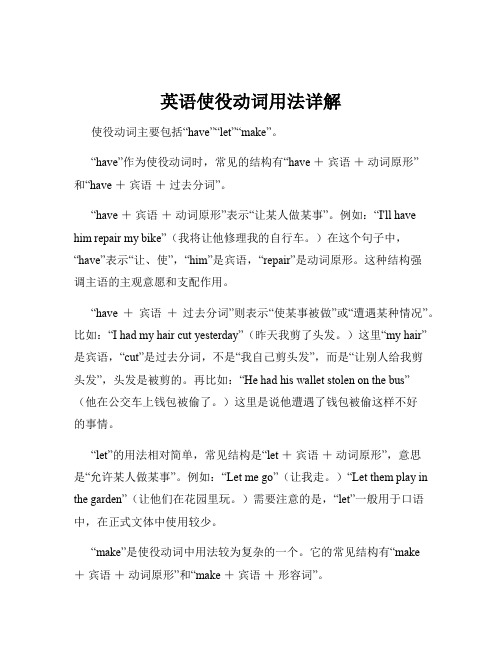
英语使役动词用法详解使役动词主要包括“have”“let”“make”。
“have”作为使役动词时,常见的结构有“have +宾语+动词原形”和“have +宾语+过去分词”。
“have +宾语+动词原形”表示“让某人做某事”。
例如:“I'll have him repair my bike”(我将让他修理我的自行车。
)在这个句子中,“have”表示“让、使”,“him”是宾语,“repair”是动词原形。
这种结构强调主语的主观意愿和支配作用。
“have +宾语+过去分词”则表示“使某事被做”或“遭遇某种情况”。
比如:“I had my hair cut yesterday”(昨天我剪了头发。
)这里“my hair”是宾语,“cut”是过去分词,不是“我自己剪头发”,而是“让别人给我剪头发”,头发是被剪的。
再比如:“He had his wallet stolen on the bus”(他在公交车上钱包被偷了。
)这里是说他遭遇了钱包被偷这样不好的事情。
“let”的用法相对简单,常见结构是“let +宾语+动词原形”,意思是“允许某人做某事”。
例如:“Let me go”(让我走。
)“Let them play in the garden”(让他们在花园里玩。
)需要注意的是,“let”一般用于口语中,在正式文体中使用较少。
“make”是使役动词中用法较为复杂的一个。
它的常见结构有“make+宾语+动词原形”和“make +宾语+形容词”。
“make +宾语+动词原形”表示“迫使某人做某事”,语气比较强烈。
例如:“The boss made the workers work long hours”(老板迫使工人们长时间工作。
)这里“workers”是宾语,“work”是动词原形,强调老板的强制作用。
“make +宾语+形容词”表示“使某人/某物处于某种状态”。
比如:“The news made him sad”(这个消息使他伤心。
使役动词用法汇总
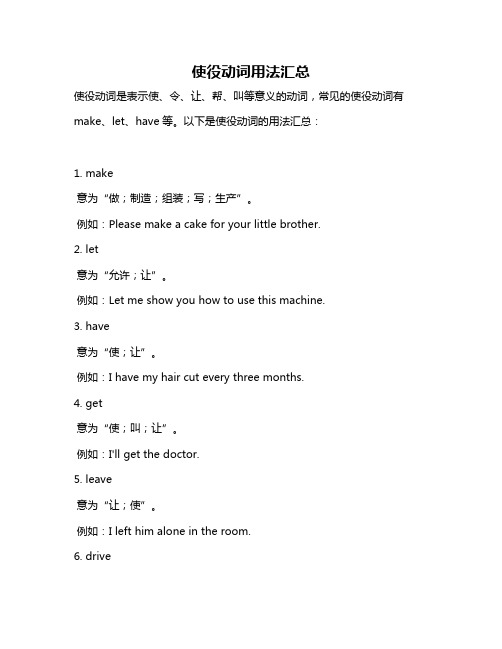
使役动词用法汇总使役动词是表示使、令、让、帮、叫等意义的动词,常见的使役动词有make、let、have等。
以下是使役动词的用法汇总:1. make意为“做;制造;组装;写;生产”。
例如:Please make a cake for your little brother.2. let意为“允许;让”。
例如:Let me show you how to use this machine.3. have意为“使;让”。
例如:I have my hair cut every three months.4. get意为“使;叫;让”。
例如:I'll get the doctor.5. leave意为“让;使”。
例如:I left him alone in the room.6. drive意为“驾驶;驱赶”。
例如:The car won't start. I think someone is trying to steal it. Let me drive it away.7. send意为“派;发送”。
例如:Send the letter by airmail.8. tell意为“告诉;讲述”。
例如:He told me the news.9. order意为“命令;点(菜)”。
例如:He ordered a pizza for lunch.10. arrive意为“到达;抵达”。
例如:I arrived in Beijing at 10 o'clock yesterday morning.11. allow意为“允许;准许”。
例如:The doctor won't allow him to go to work.12. permit意为“允许;许可”。
例如:The government doesn't permit the use of chemical weapons.13. support意为“支持;帮助”。
使役动词的分类和例子 → 名词的分类和例子

使役动词的分类和例子→ 名词的分类和
例子
使役动词的分类和例子
使役动词是一类用来表示让别人或物体做某事的动词。
以下是使役动词的分类和例子:
1. 直接使役动词:
- 强制使役:迫使、逼迫、命令
- 例子:他迫使我完成这个任务。
- 请求使役:劝告、请、要求
- 例子:我请他帮我修理电脑。
- 启发使役:鼓励、激励、启发
- 例子:她鼓励我学好英语。
2. 间接使役动词:
- 员工使役:让、任命、委派
- 例子:公司任命她为经理。
- 家长使役:教、培养、引导
- 例子:父母教我弹奏钢琴。
- 触发使役:使、叫、让
- 例子:她使我感到害怕。
名词的分类和例子
名词是用来表示人、事物、地点或概念的词语。
以下是名词的分类和例子:
1. 人名:
- 姓名:张三、李四、王五
- 称号:先生、女士、博士
2. 地名:
- 国家或地区:中国、美国、日本
- 城市或村庄:北京、纽约、东京
3. 物体名:
- 动物:狗、猫、鸟
- 自然物:山、河、海
- 人工物:桌子、椅子、手机
4. 概念名:
- 抽象概念:爱、幸福、友谊
- 具体概念:研究、工作、旅行
以上是使役动词和名词的分类和例子。
通过学习和使用这些词汇,我们可以更准确地表达我们的意思。
- 1、下载文档前请自行甄别文档内容的完整性,平台不提供额外的编辑、内容补充、找答案等附加服务。
- 2、"仅部分预览"的文档,不可在线预览部分如存在完整性等问题,可反馈申请退款(可完整预览的文档不适用该条件!)。
- 3、如文档侵犯您的权益,请联系客服反馈,我们会尽快为您处理(人工客服工作时间:9:00-18:30)。
使役动词,指的是make, have, let这三个动词,它们在后接不定式作宾语补足语时要省去不定式符号to。
但具有使役意义的动词数量上远不止这些。
使役动词have, let, make (常用于复合结构)1. have的用法(1)have +宾语+do(省略to的不定式):表示主语“要”“使”“让”宾语干某事,宾语和宾补之间是一种主动关系。
The rich lady had the singer eat with her servants. 这位富有的女士让这位歌手和她的仆人一起吃饭。
(2)have+宾语+现在分词:表示让某人或物连续进行某动作或处于某状态中,宾语和宾补是一种主动关系。
The two cheats had the lights burning all night long.这两个骗子让灯整晚亮着。
He had us waiting for him three hours yesterday.昨天他让我们一直等了他三个小时。
(3)have +宾语+过去分词:表示主语的主观意志,即主语让别人为自己完成某事,宾语和宾补是动宾关系,还可以表示主语遭受到来利或不测的事。
Tom said he had had his TV set repaired.汤姆修了他的电视机。
(别人修的)Tom had his wallet stolen on the bus yesterday.昨天汤姆使他的钱包被偷了。
(别人偷的)(4)have+宾语+形容词/副词/介词短语作宾补Please have your tickets ready.请准备好你的票。
The Emperor had nothing on.这位皇帝什么都没在做。
2. let的用法(1)let +宾语+do(省to不定式):表示主语“要”“使”“让”宾语干某事,宾语和宾补之间是一种主动关系。
Let them stay in the classroom and do their exercises themselves.让他们自己待在教室里做练习吧。
Let AB be equal to CD.假设AB等于CD.(2)let+宾语+副词/介词短语作宾补Let me in and let them out.让我进来,让他们出去。
Who let you into the building?谁让你进到大楼里来的?3. make的用法(1)make +宾语+do(省to不定式):表示主语“要”“使”“让”宾语干某事,宾语和宾补之间是一种主动关系。
此结构常用被动结构。
The teacher made the naughty boy stand there for an hour.老师让这个调皮的男孩在那里站了一个小时。
The naughty boy was made to stand there for an hour.这个调皮的男孩被让在那站了一个小时。
(2)make+宾语+过去分词,此结构中的宾语指人时常用到反身代词。
He raised his voice to make himself heard.他提高嗓音让自己被听到。
They will make an important plan known to the public soon.他们不久就会让公众知道这个计划。
(3)make+宾语+形容词,宾语亦可是从句。
The news made her happy.这个消息使她快乐。
He made it clear that he objected to the proposal. 他明确表明他反对这个建议。
使役意义状态动词get, leave, set, send, keep, drive等,常用于复合结构中1. get:使成为/变得某种状态或结果。
I can’t get the old radio to work.我无法让那旧收音机工作起来。
(接带to不定式作宾补)Can you really get that old car going again?你真能让那旧车运转起来吗?The farmer got his planting done before the rain came.那农民在雨季前完成了种植。
He got his wrist broken.他折断了手腕。
(主语发生了不幸的事)She soon got the children ready for school.她迅速使孩子们做好了上学准备。
2. leave:使保持/处于某种状态Leave your hat and coat in the hall.把帽子和外套放在大厅里。
Did you leave the doors and windows firmly fastened?你把门窗紧紧锁上了吗?Always leave things where you can find them again. 总应把东西放在能再次找到的地方。
Who left that window open?谁让窗户开着? Don’t leave him waiting outside in the rain.别让他在外面雨中等待。
Leave somebody / something alone.不要干涉某人或某事。
3. set:使某人或某物处于或达到某种特殊的状态或关系set somebody at his ease 使某人安逸/舒适/心情放松set something in order 使某物井然有序set somebody free / at liberty 使某人获得自由,释放(犯人等)It’s time we set the machine going. 是我们发动机器的时候了。
The news set me thinking. 这消息使我陷入了沉思。
He set the farm laborer to chop wood. 他让农场工人去砍伐木材。
I have set myself to finish the job by the end of May. 我决心于五月底前完成那工作。
set a thief to catch a thief. 以毒攻毒;令贼捉贼4. send:使某人或某物急剧地移动The earthquake sent the crockery and cutlery crashing to the ground.地震将杯盘刀叉震落在地上。
Mind how you go----you nearly sent me flying. 小心点,你差点将我撞飞了.Send that fellow about his business / packing. 叫那家伙滚蛋.The good harvest sent the prices down. 丰收使物价下跌.5. drive:使某人处于某状态,迫使某人做某事Failure drove him to despair / desperation. 失败使他绝望。
You’ll drive me mad / to my wits’end. 你会把我气疯的。
/ 你会使我穷尽应付的。
Hunger drove him to steal. = He was driven by hunger to steal.他为饥饿所迫而偷窃。
6. keep:使某人或某物保持某种状态You should keep the children quiet. 你要使孩子们静下来。
The cold weather kept us indoors. 寒冷的天气使我们待在家里。
If your hands are cold, keep them in your pockets. 如果你手冷,把它们放在口袋里。
Will they keep me in prison / custody. 他们会监禁/拘留我吗?I’m sorry I’ve kept you waiting. 很报歉让你久等了。
The doctors managed to keep me going. 医生们设法让我活下去。
使役意义动态动词1. cause 致使,导致(能接直接宾语,双宾语,复合宾语)What caused his death? 什么导致了他的死亡? This has caused us much anxiety. What caused the plants to die.(=what made them die.)什么使得这些植物枯死。
He caused the prisoner to be put to death. (=he had them put to death.)他使得这些犯人被处死。
2. force 迫使,强迫(宾语后常接介词短语、副词及不定式等)force one’s way through a crowd 从人群中挤出一条路来.force a way in / out / through 冲入/出/过force an entry into a building 强行进入一建筑force the war upon him 强迫某人作战force someone into doing something 强迫某人做某事force sb./ oneself to work hard 迫使某人/自己努力工作“半使役动词”amaze, astonish等1. 常见的半使役动词amaze(使某人感到惊呀)astonish(使某人感到惊奇)bore(使某人感到厌倦)confuse(使某人感到迷惑)delight(使某人感到高兴)discourage(使某人感到气馁)excite (使某人感到兴奋)encourage(使某人感到鼓舞)exhaust (使某人感到疲倦)frighten(使某人感到恐惧)interest (使某人感到有趣)upset (使某人感到迷惑不解)等等。
2. 半使役动词的主动式用法:something + vt. + somebodyThe exam result satisfied his parents.考试结果令他的父母很满意。
The boy’s behavior upset everybody around.这个男孩的行为使周围的每个人都很沮丧。
3. 半使役动词有两个或三个派生形容词,一个加-ing,一个加-ed,有时还有一个加其他后缀构成。
如:interest----interesting, interested;astonish----astonishing, astonished;please----pleasing, pleased, pleasant;satisfy----satisfying, satisfied, satisfactory.4.半使役动词的v-ing和v-ed两个分词形容词的用法也有规律,一般而言,作定语时,v-ing分词形容词修饰事物,v-ed分词形容词修饰人或者人的心理活动、表情等;作表语或宾语补足语时,v-ing分词形容词指事,v-ed分词形容词指人或拟人用法,而且作表语的v-ed分词后接事时常有一个介词,如:The film we saw last night was very interesting.我们昨天晚上看的电影非常有趣。
